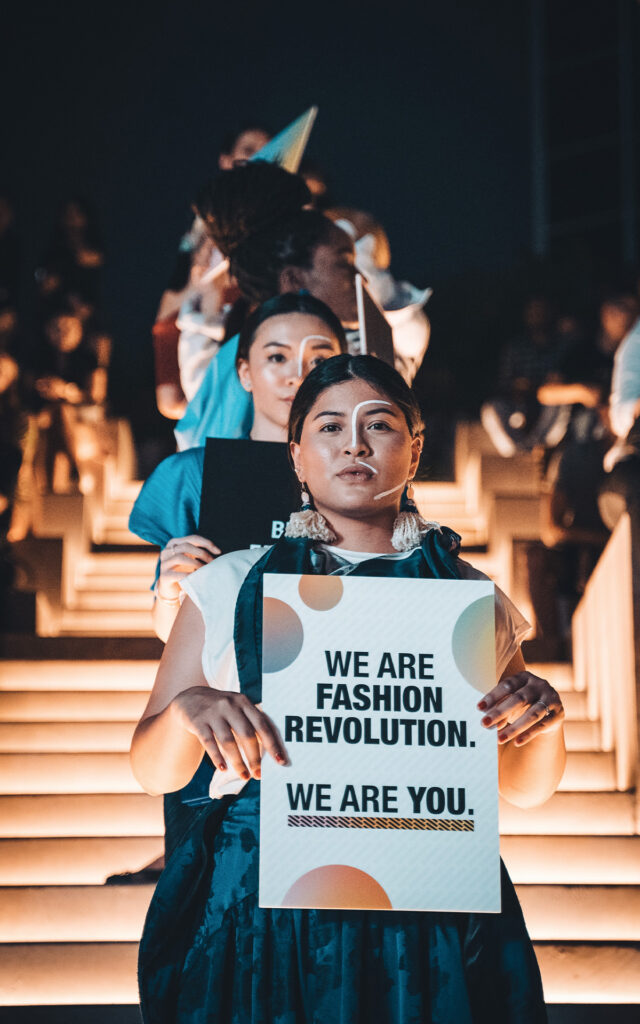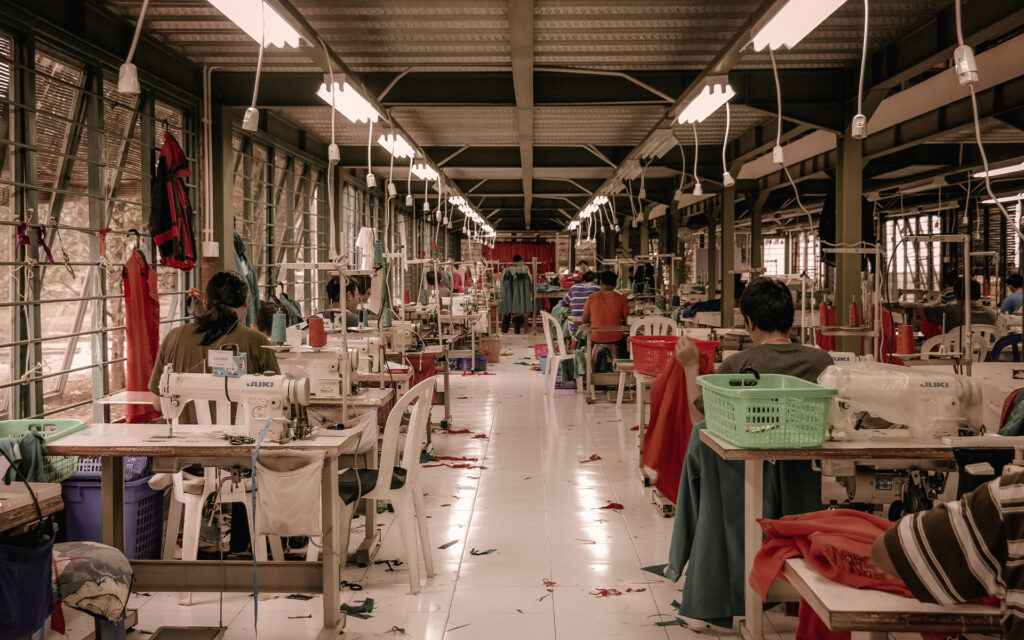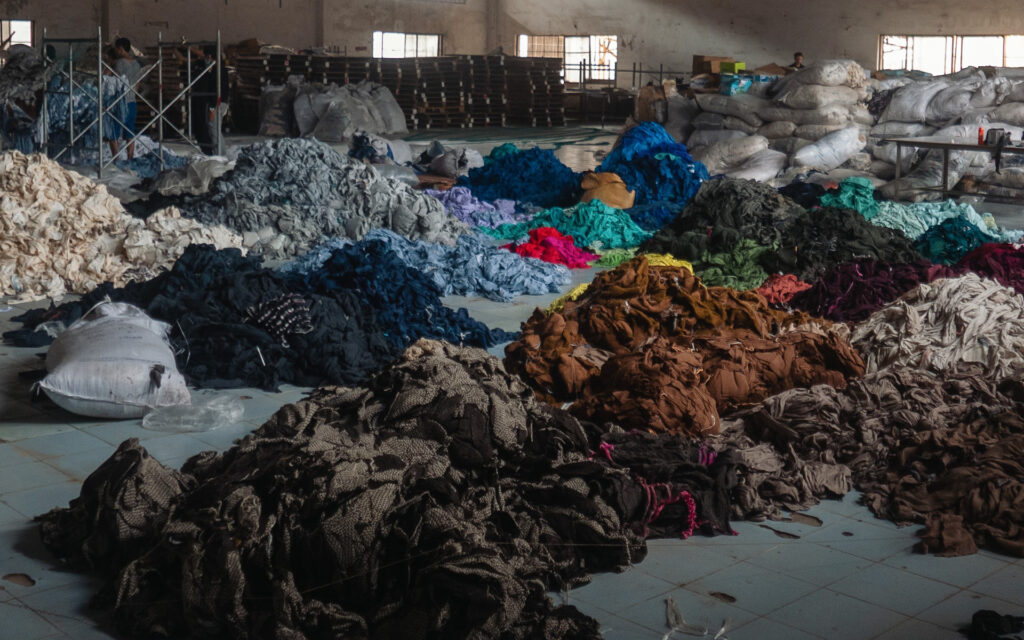Nowdays millions of people work in the fashion industry. Many of them see their fundamental human rights violated. Garment workers, 80% of whom are women, face poverty, complex working conditions, and continuous violations of their rights. At the same time, the legislation of their country (usually developing countries and not only) often fails to protect them.
Exploitation may include:
- Meager minimum wage
- Forced labor
- Excessive working hours
- Lack of contracts and social security
- Lack of safe working conditions
- Harassment of women workers
- Violation of freedom of association
- Child labor
According to Fashion Revolution, most garment workers earning low wages cannot afford basic human needs such as food, housing, and healthcare.
Its Fashion Transparency Index revealed that 99% of major fashion firms continue to underreport the number of workers in their supply chain who are paid a living wage. It also indicates that only 23% explain the prevalence of violations related to modern slavery and risk factors in their production chain.
Nearly 97% of the sector’s fashion items come from countries such as Bangladesh, Cambodia, China, India, Indonesia, the Philippines, Thailand, and Vietnam.
Reuters estimates that the minimum wage and living wage gap in 28 producing countries is 48.5%.
Remembering Rana Plaza
April 24, 2023 marked the 10th anniversary of the Rana Plaza catastrophe, when the fashion industry had to change after more than 1,000 workers died and around 2,000 were injured when a factory in Dhaka, Bangladesh, collapsed.
The subsequent investigation revealed that the factory had two illegal plants and that the collapse was the result of the machines used that destabilized the construction.
At least 29 firms produced in the Rana Plaza factory, including Benetton, JCPenney, Mango, Primark, Walmart, and Inditex.
Thanks to the legally binding Bangladesh Accord on Building and Fire Safety, which brought together the government, trade unions, and more than 90 brands, Bangladesh’s garment factories are safe for millions of workers.

General overview
Workers in the textile industry are not paid enough to meet their basic needs.
Good on You explains that in China the legal minimum wage is still far below a living wage. In Bangladesh, Vietnam, and Indonesia, wages are only a quarter to half of what a worker needs to live a decent life. According to the Clean Clothes Campaign, the gap between current wages and a living wage is often greater in European production countries than in Asian countries.
In Europe, garment workers’ wages are well below the poverty line. This has led to the Good Clothes Fair Pay campaign, a European citizens’ initiative for living wages in the fashion supply chain, which calls for legislation to help achieve fair wages for garment and textile workers around the world.

Protective legislation
For decades, industry workers worldwide have fought for fair wages and safe working conditions, demanding laws to protect them from persistent exploitation. The increasing complexity of globalized supply chains has meant that firms have been able to shirk their responsibility, leaving workers defenseless. That is why regulators are stepping in to require stricter regulations from companies.
According to the UN Guiding Principles on Business and Human Rights, companies have a responsibility to respect the human rights of workers, and cannot act in ways that have a negative impact. The ACT is an agreement between 19 global firms in pursuit of living wages for workers in textile and garment supply chains, operating in Turkey, Bangladesh, and Cambodia. Some signatories to the agreement include H&M, Inditex, Primark, PVH Corp. and Zalando.
United States
In the state of California, the Transparency in Supply Chains Act has been in place since 2010. While in 2021 the Garment Worker Protection Act was created.
In 2022, Assembly Bill A8352 was enacted in New York requiring fashion retail sellers and manufacturers to disclose their environmental and social due diligence policies; and S. 3578 Slave-Free Business Certification Act requiring certain companies to disclose the use of forced labor in their direct supply chain.
European Union
The European Union has a Generalized System of Preferences (GSP) which provides preferential access to the EU market, with the primary objectives of contributing to the eradication of poverty by expanding exports from developing countries and guaranteeing fundamental human and labor rights.
The European Parliament also approved legislation to integrate human rights and environmental impact into governance, which will oblige companies in all sectors to prevent, eliminate, or mitigate the negative impact of their activities, making non-compliant companies liable to be sanctioned by national supervisory authorities.
In EU countries such as Germany, the Act on Due Diligence of Companies in supply chains has been adopted, and in France we have the Act 2017-399 on the duty of care of companies.
Other countries
Great Britain has had the Modern Slavery Act since 2015; while Australia has had the Modern Slavery Act since 2018. Both address labor conditions in global supply chains.
While regulations protecting workers’ rights have long been in place, lack of effective enforcement and weak sanctioning power has allowed for continued human rights abuses in the industry.
For any legislation to be effective in improving garment workers’ rights throughout the global supply chain, there must be clear means and mechanisms for enforcement, independent complaint mechanisms that allow workers to easily file complaints, and binding labor rights outcomes.
Theresa Haas, Director of Global Strategies, Workers United.
Modern Slavery
According to the United Nations, modern slavery refers to situations of exploitation in which people find themselves and cannot refuse or leave due to threats, violence, coercion, deception, or abuse of power.
In accordance to the International Labor Organization (ILO), about 50 million people are victims of this type of exploitation, which has increased in recent years as a result of the fast fashion economic model based on overproduction, putting pressure on the supply chain that cannot meet the usual operations.
According to the Global Slavery Index 2023 report, this slavery is present in industries characterized by informality.
Nearly two-thirds of all forced labor cases are related to global supply chains, and most of these forced labor cases are found at the lowest levels of supply chains, such as the extraction of raw materials and production stages.
However, there is a mistaken belief that poor working conditions in the sector only affect Third World countries, as they have been implicated in repeated cases of modern slavery.
Nevertheless, these types of human rights violations can also be found in first-world countries.
Close to home
In 2020 in Britain, Labour Behind the Label published evidence exposing forced labor in garment factories in the city of Leicester, England, revealing that workers were forced to work long hours for £3 an hour and forced to work without social distancing measures during the pandemic.
An investigation by The New York Times collected evidence from around sixty women in the Puglia region of Italy who worked from home or in a small workshop without a regulated contract in the Italian fashion textile sector and for low pay.
Asia Floor Wage Alliance (Afwa) together with 20 workers’ unions filed a lawsuit against Nike for non-compliance with Organization for Economic Cooperation and Development (OECD) standards for non-payments to its suppliers after the company canceled orders in 2020.
On the other hand, Afwa together with Global Labor Justice-International Labor Rights Forum (GLJ-Ilrf) filed claims against major companies such as Nike, Levi’s, and VF Corporation (owner of Supreme, Timberland, The North Face, and Vans) to compensate workers for delayed wage payments during the pandemic.

Outlook for the future
The fashion industry is under scrutiny. The full price of a garment must include a living wage, on which the workers who make it can live.
Greater transparency makes it possible to identify risks that could undermine the human rights of workers.
To this end, the regulation of sweatshop legislation along the supply chain that obliges companies to monitor and report on their impact and hold them accountable for abuses is essential.
A living wage is not a luxury, it is a fundamental human right.
Fashion Revolution.





